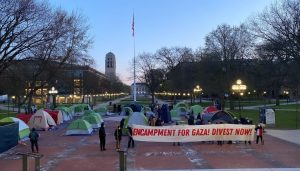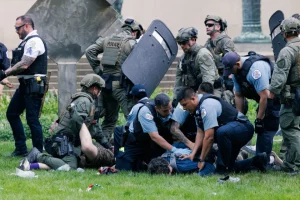Many stories have occurred since the war began on October 7, but there are hidden stories that may not be known to everyone. For example, about 2,000 men from Gaza were working in Israel, but since the outbreak of the war, they and workers from the West Bank have been expelled from these lands. Workers from the West Bank returned to their homes, but the others from Gaza could not return because the Strip became a closed military zone. So they had no choice but to migrate to the cities of the West Bank, where they were welcomed. But you can imagine how difficult it is for them: They know that their homes will be demolished, and their families will be persecuted and evicted from their homes. Even if these people feel safe in the West Bank, there is a pain in their hearts and constant worry about their families.
Another hidden story concerns a group of women stuck here in Nablus in the West Bank. These women underwent In vitro fertilization (IVF), some in Nablus, and others in Egypt. When the time came to give birth, the option was to come to Nablus because of the advanced equipment and the existence of a specialized nursery department for caring for newborns after birth. There are about 12 women; I interviewed six of them, each arriving on a different date, and each from a different area in the Gaza Strip.
Importantly, every pregnant woman needs a companion when coming to Nablus. They need to seek approval from Israel to be allowed to leave Gaza with a companion (like a visa). Imagine that a Palestinian has to apply for a visa to travel between Palestinian cities!
Every pregnant woman I interviewed received approval, but unfortunately, the problem they always face is getting approval for the companion. Rarely does a close relative companion get approval to leave. So they continue to search for someone to obtain approval to leave Gaza, usually a distant relative or even a neighbor, and each companion leaves a family behind in Gaza.
These women came to Nablus to give birth before October 7, and were supposed to stay for at most a week, then return to their homes and reunite with their families and husbands to rejoice in the arrival of the newborns. But unfortunately, the war broke out, and they got stuck in Nablus.
The people of Nablus provided housing and basic needs for these women, but they still need help. Even that doesn’t alleviate their longing for their families and husbands, and they know how much everyone longs to see the babies. Some family members of the women are still in the north, and others live in the camps near Rafah. Fortunately, most of the women’s husbands are still alive, but many of them have lost significant portions of their families. Many of them had good jobs before the war — computer engineers, dentists, office workers, lawyers — and their lives are now completely turned upside down.
There was a woman who was deaf and spoke only sign language, and her husband was also deaf. All of the women gave birth to twins. Additionally, all of the new families live together in accommodation near the hospital and try to find comfort in each other to cope with this new reality. It is not possible for their spouses to come to the West Bank, nor can the women return to Gaza. Many have waited for years and undergone dozens of miscarriages to finally conceive, and their husbands can wait to meet their children.
The stories of courage and perseverance from Gaza to Nablus show how Palestinians face adversity with strength and hope. Despite the challenges, they stand resilient.
As we witness their struggles, it’s important to offer support however we can. Whether through aid or advocacy, every act of solidarity makes a difference.
In these tough times, let’s remember the power of compassion and unity. By standing together, we can help build a future where all Palestinians can live in peace and dignity.










